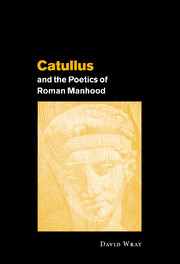4 - Towards a Mediterranean poetics of aggression
Published online by Cambridge University Press: 08 October 2009
Summary
I'll tell you.
About my poetics –
Louis Zukofsky, A-12
CATULLUS AND THE PROBLEM OF AGGRESSION
Clinical psychology gives the name “aggression” to any action delivering “noxious stimuli to another organism” with intent to cause physical or psychic injury, including acts of speech and gesture productive of shame or humiliation. On that definition, well over half the poems of the corpus (I count sixty-nine) feature Catullus performing or threatening aggression against an interlocutor or third party, or else decrying, suspecting or fearing aggression in the behavior of others. No getting around it: the speaker of Catullus' poems is not a nice man, by any stretch of imagination or interpretation. Aggression poses an ethical problem in any context. Catullus' aggression, the question of how he came to be such a good hater, continues to pose a critical problem as well.
A Romantic answer to that question, already rehearsed here, located the source of his florid outbursts in the personal disillusionment of a heart broken and a life wrecked at the hands of a “worthless mistress.” Much of the fiercest Catullan vituperation can be, and was, woven prosopographically back into the Lesbia novel, chiefly by making the male victims of his poetic aggression into rivals for her love; what could not be conscripted into that service (or characterized, alternately, as “political invective”) was taken as an indicator of the depths to which a young man so lately callow had sunk. On the one hand, that interpretation is of course not entirely without basis in the poems themselves.
- Type
- Chapter
- Information
- Catullus and the Poetics of Roman Manhood , pp. 113 - 160Publisher: Cambridge University PressPrint publication year: 2001

